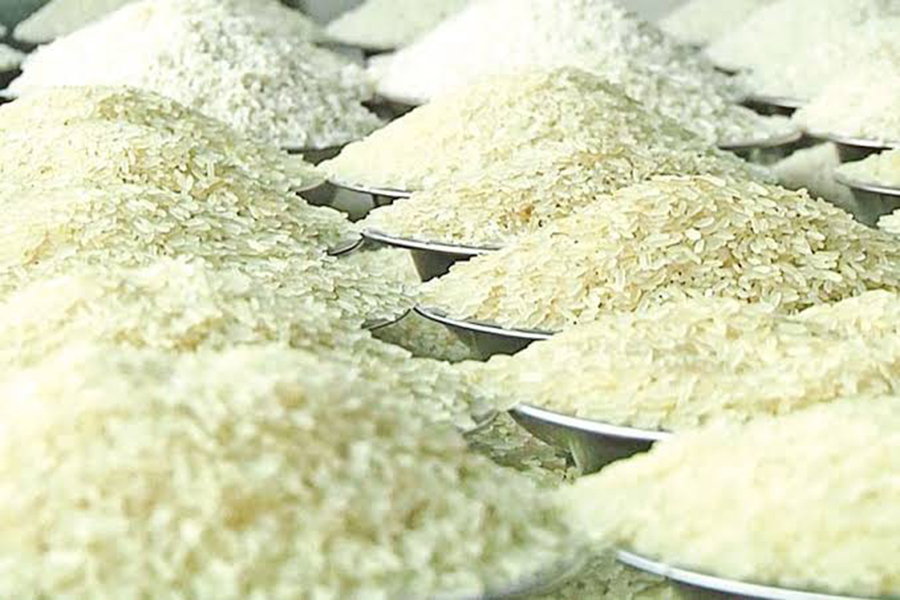Tags
MoC revokes DNCRP’s directive on Miniket, Jeerashail rice
Yasir Wardad

The Ministry of Commerce (MoC) on Tuesday rescinded the recent Directorate of National Consumers’ Right Protection (DNCRP) directive that rice mills have to stop selling rice under the names of Miniket and Jeerashail. The DNCRP is an entity under the MoC.
It also requested the food ministry to look into the matter and make a decision on the marketing of these varieties.
The Financial Express published a report titled “Auto rice millers, govt row over Miniket, Jeerashail” on Tuesday.
According to rice market stakeholders, the commerce ministry’s statement means mills can now continue selling Miniket and Jeerashail rice unless the food ministry gives a new instruction.
The DNCRP on July 13 instructed rice mills and companies to stop selling rice under the names of Miniket and Jeerashail.
It said rice companies would have to withdraw all the products packaged as these varieties within July 31, and the authorities would start issuing fines on August 16.
Md Abdur Razzak, additional secretary at the commerce ministry, said the ministry has written a letter to the food ministry, stating that the DNCRP does not have the authority to issue such a ban.
He said the DNCRP’s role is to carry out the ministry’s decisions, not to make those.
Earlier, the DNCRP had asked rice millers and traders to stop using the names Miniket and Jeerashail because these are not officially recognised varieties.
According to it, many millers take a different variety called BRRI Dhan 28, polish it heavily, and then sell it under the names of Miniket and Jeerashail.
This practice not only misleads consumers but also wastes a lot of rice during the polishing process, it said.
The Bangladesh Rice Industries Association (BRIA), which represents many of the country’s big auto rice millers, sent a letter to the commerce ministry on July 20, asking it to lift the DNCRP ban.
The letter said the ban is already creating serious problems for both farmers and millers.
According to BRIA, about 5.0 million tonnes of paddy meant for making Miniket and Jeerashail rice are now stuck with farmers.
Millers and traders also have large stocks of unsold rice in their warehouses, it said.
Because of the ban, many mills have stopped buying paddy from farmers, leading to financial losses in rural areas, said the association.
The letter was signed by major rice companies, including Akij Food, TK Group, City Group, Meghna Group, PRAN (Bongo Millers), ACI, Sadman Agro Food, and others.
Earlier, a meeting was held on July 13, which was chaired by the director general of DNCRP and attended by all parties concerned.
During the meeting, the DNCRP chief said he had received many complaints from consumers and the media about rice sold under the name of Miniket.
People asked what steps the DNCRP was taking to protect consumers, he said.
He mentioned written responses from companies like ACI and Rashid Group and referred to the 2024 Food Rules, especially Rule 3(a), which prohibits harmful practices in food production, marketing, and supply.
The official asked everyone to consider whether using the name Miniket goes against these rules.
Md Afif Al Mahmud Bhuiyan, a deputy director at the Directorate General of Food, said many companies are still selling rice under the name of Miniket, which is illegal as per the current food laws.
Only rice varieties officially approved by the National Seed Board should be sold under their real names, he said.
DNCRP Director General Mohammed Alim Akhter Khan could not be reached for comments on the matter.
SM Nazer Hossain, vice-president of the Consumers Association of Bangladesh (CAB), the leading non-government group working for consumer rights, said important institutions may collapse if such interference continues.
He mentioned that Akij Food also requested the government to allow the sales of Miniket and Jeerashail rice even though state-run agencies are trying to control this.
This is clearly “a conflict of interest” because the current adviser of the commerce ministry comes from a family that owns an auto rice mill and they recently asked the government to permit Miniket rice sales, he said.
Hossain also said if a variety called Jeerashail really exists, it would only make up about 4.0 to 5.0 per cent of the total rice in the market – around 2.0 million tonnes.
“But more than 10 million tonnes of rice are being sold under the names of Miniket and Jeerashail. So, where does the extra rice come from?”
The CAB official also said repeatedly polishing rice to make it look finer reduces its nutritional value, which is harmful to consumers.
https://thefinancialexpress.com.bd/trade/lg-energy-solution-inks-43b-battery-supply-contractPublished Date: July 30, 2025






